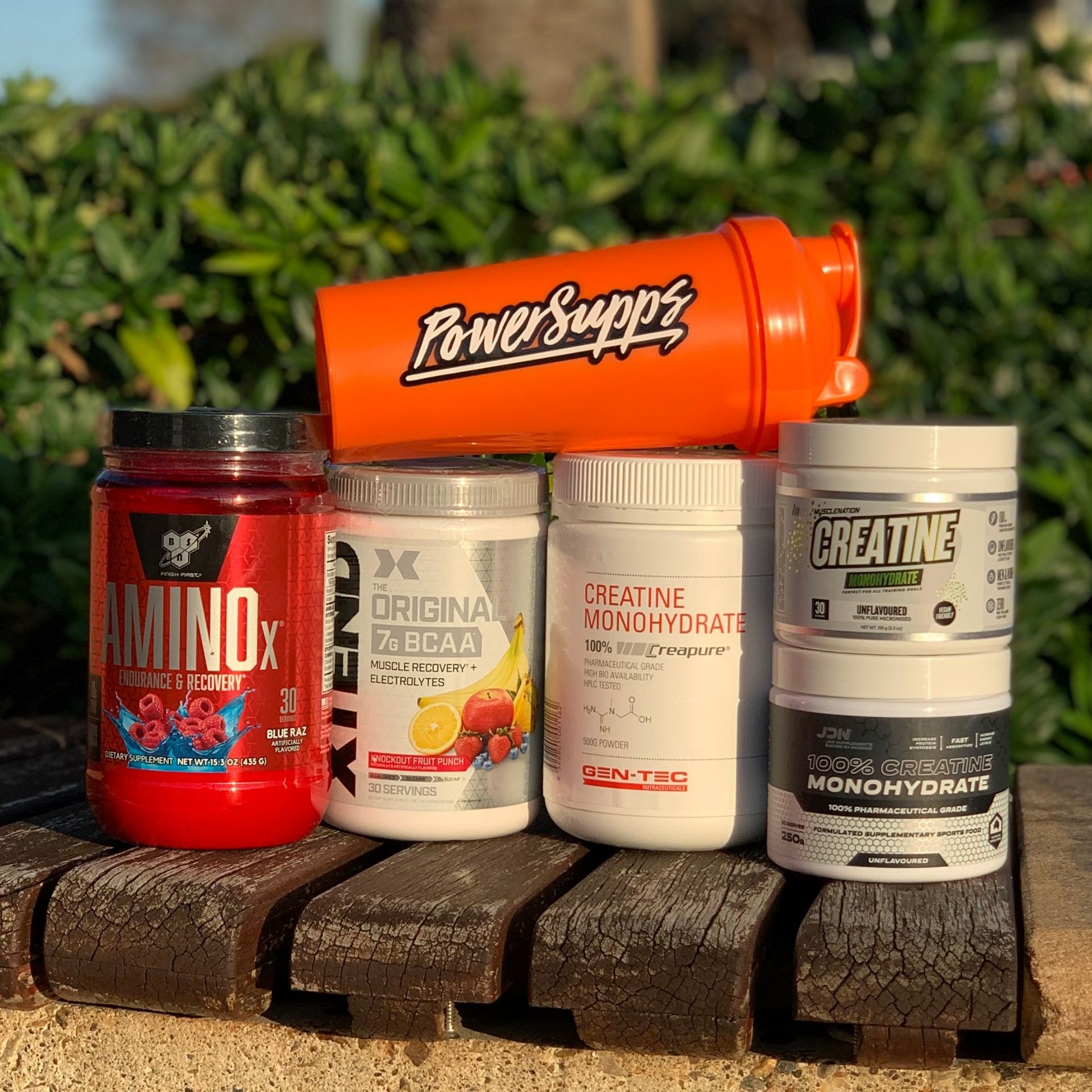Supplements
Are BCAA’s better than Creatine?
When it comes to popular supplements, BCAAs and Creatine are top of the list. Both are heavily researched and have years of scientific data to back up their effectiveness. Whey protein is still king, but the aminos are fast gaining more popularity. The big question is are bcaa’s better than creatine? They are both extremely beneficial when it comes to performance and muscle gains so if we had to choose which would it be. Lets take a deeper look into these popular products and ingredients!
What Are BCAA’s?
Branched chain amino acids or BCAAs as they are more commonly known are a group of three essential amino acids. These amino acids are Leucine, Isoleucine and Valine.
BCAAs play a role in a number of physiological processes in the body. These three amino acids have been heavily researched over the years. Performance and strength improvements have been seen due to the BCAAs aiding in increasing muscle mass and decreasing the prevalence of muscle breakdown. BCAAs are also very well known for diminishing the effects of delayed onset muscle soreness. This will speed up the recovery process and get you training more frequently. In addition to this BCAAs are also well known for aiding hormonal function and enhancing fat burning capabilities.
How Do BCAAs Work And What Are Their Benefits?
BCAAs differ in the sense that they bypass the digestive system and are rapidly absorbed into the bloodstream. They can then be utilised more effectively by the body.
Here we will specifically looking at the benefits BCCAs have in regards to training and performance.We will take a closer look into how they enhance muscle protein synthesis, enhance recovery and reduce fatigue and muscle soreness.
BCAAs And Their Role In Enhancing Muscle Protein Synthesis
Of the three BCAAs, Leucine plays the greatest role in stimulating muscle protein synthesis. As we exercise, the body breaks down amino acids and muscle protein. Sipping on BCAAs both prior to and during exercise means that your body has a constant supply of amino acids. This will improve the muscle recovery rate and ensure the muscles stay hydrated.
Leucine stimulates the pathways that lead to the cellular processes of tissue regeneration. It also aids in muscle protein synthesis and metabolism in combination with ATP production. Having a constant supply of BCAAs essentially means that performance is not affected through any form of muscle degradation. This is generally what will occur during resistance training.
BCAAs And Their Role In Reducing Muscle Soreness, Fatigue And Enhancing Recovery
During prolonged exercise or during periods of intense training BCAAs do assist in reducing the breakdown of muscle tissue. BCAAs play a role in inhibiting cortisol and also the levels of tryptophan. Staving off the effects of cortisol lead to faster recovery time and less overall muscle soreness. While blocking the level of tryptophan delays both central and peripheral fatigue allowing you to exercise for longer at a higher capacity.
Glucose is our main source of energy during prolonged bouts of exercise. When these levels deplete, BCAAs can serve as an alternative source of fuel for the muscles. Generally it is a very efficient source of fuel due to BCAAs being able to bypass the digestive system.
Delayed onset muscle soreness is believed to be the result of small tears in the muscles during exercise. Consuming BCAAs either before, during or after training will decrease the levels of creatine kinase in the muscles. Less downtime essentially enables us to train at a greater capacity more frequently.
Why Should I Supplement With BCAAs?
If taking aminos is something you have been questioning then read on! They definitely have their advantages irrespective of your level if training. BCAAs are incredibly versatile and can be consumed either before, during or after training.
Now timing does matter and their effects tend to be at their peak approximately 30-60 minutes after consumption. If your goal is to increase muscle mass or even improve endurance BCAAs are your answer. The addition of a high quality BCAA supplement with the 2:1:1 ratio will give your body the amino acids that it requires for both enhancing protein synthesis and kickstarting recovery.
BCAAs are a fantastic tool to help you to recover from heavy bouts of intense exercise. The accumulation effect that weekly rigorous workout routines seem to create. They may be effective for helping alleviate some of the soreness you experience in the 24-72 hours after exercise.
If your goal is weight loss then BCCAs certainly should have prime position in your supplement stack. BCAAs aid in warding off those cravings and blood sugar fluctuations experienced during dieting phases.
BCAAs provide a steady fuel for your working muscles during exercise and ensures blood sugar levels are regulated. This means you will be able to keep your level of effort for a long period of time. Rather than a sudden burst of power, BCAAs provide a steady flow of energy. It will allow you to perform at a sustainable rate and burn a greater amount of fat.
BCAAs also lower the levels of serotonin in your body. This helps to keep your brain feeling awake and ready to focus on your training and staving off the effects of fatigue.
What Is Creatine?
Creatine is one of those supplements that sounds interesting and is well known but most are unsure of what it does. Creatine is in fact a molecule that is produced from certain amino acids in the body. More specifically, Creatine is derived from the amino acids Methionine, Glycine and Arginine.
Creatine is made primarily in the liver and then also in small amounts in the pancreas and the kidneys. The majority is stored in skeletal muscle as in the skeletal muscles as Phosphocreatine. Phosphocreatine is comprised of phosphate groups which provide an easily accessible supply of creatine for the re-synthesis of adenosine triphosphate or ATP.
ATP is the primary carrier of energy in the human body and this entire process is required in situations where energy demand is high during periods of intense physical or mental activity. During short-term bouts of exercise the ATP energy system is favoured by the body.
Creatine is depleted daily and must be topped up through the foods that we eat. Creatine can be found in foods such as meat, eggs, fish and chicken. Although food should always the first source of Creatine, supplementation is also common and shown to be extremely effective.
How Does Creatine Work and What Are The Benefits?
In terms of enhancing performance abilities, Creatine does in fact aid in a number of ways. We now know what it is but lets take a closer look into how creatine works and what its benefits are.
Creatine and Improved Strength, Power and Overall Performance
As creatine has a direct role in ATP production which means that there is a direct effect on strength, power and overall performance and output.
When it comes to certain high-intensity forms of exercise, by having more Phosphocreatine stored in the muscles, more ATP can be produced and enhance both performance and adaptations to training. An overall improvement in training capacity ideally means greater muscle growth which is a significant win if that is your goal. Basically Creatine improves strength gains by enabling a faster regeneration of ATP.
Creatine and Greater Muscle Volume – That Fuller Look
Oh how we all love to look bigger!! Creatine draws more water within the muscle cells. Creatine supplementation in conjunction with regular resistance training can be a catalyst for increasing muscle volume.
This form of cellular swelling also has an anabolic effect on the muscles themselves and can increase muscle protein synthesis. What this is meaning is that in the short-term the muscles can appear fuller and over time, creatine will help them to increase in overall size. So a win-win really!
Muscle Protein Synthesis
Creatine can be effective for gaining muscle mass regardless of the length of time you consume it for. It is known for being highly effective in building muscle mass. When it comes to increasing muscle mass naturally, Creatine is the most widely researched and the most effective.
Even when taken for very short periods of time, Creatine can naturally enhance muscle growth in both men and women.
When Should I Supplement With Creatine And Is It For Me?
If increasing muscle mass and strength are you primary goals then creatine is definitely for you. Supplementing with creatine daily and ideally around 30-60 minutes prior to training allows for the creatine to be digested by the body and for the benefits to felt whilst exercising.
If you are a lover of your post workout protein shake then adding creatine into your shake in the post-workout window when your muscles are depleted will greatly help replenish nutrients and aid in recovery.
What Type Of Creatine Should I Get?
When it comes to types of creatine there can potentially be some debates here as which type is best and why. As there are several types it can be confusing as to which may work best.
Despite the number of creatine types, Creatine Monohydrate is by far the most widely researched and no other form of creatine has been shown to be any more beneficial. Creatine Monohydrate has been scientifically proven to significantly improve performance and provide a number of benefits to the user with both short and long-term use.
Can BCAAs Supplements and Creatine Be Taken Together?
So you might be wondering if you can take both BCAA supplements and Creatine together. The short answer to this question is yes.
Consuming both will enable your body to have the amino acids for building lean muscle mass, increasing strength and power and fuelling the body for training in general.
Creatine will supply your body with a more rapid source of energy whereas BCAAs will provide a more steady source of energy and leucine will greatly aid in muscle repair and recovery.
BCAA vs Creatine: Which Should I Choose?
BCAAs and Creatine are two supplements which are both highly researched and incredibly popular among bodybuilders, athletes and those who train for health and wellbeing. Both can be taken as separate supplements or can be stacked together for an extra workout boost.
ATP derived from creatine phosphate powers the first seconds of muscle contraction. So if your training is more demanding power and strength wise or you require sudden bursts of energy then Creatine is for you.
BCAAs on the other hand provide a more steady dose of energy, aid in muscle protein synthesis and decrease muscle soreness and enhance the recovery process.
Whether you choose to use one or the other or both however, always be sure to read the correct dosage on your products. As much as what many of us think more is always more, this is in fact not the case with BCAAS and Creatine. Correct consumption will provide you with ample benefits and have you well on your way to achieving your goals and ideal physique.

